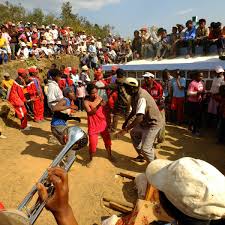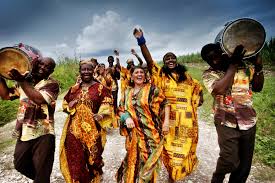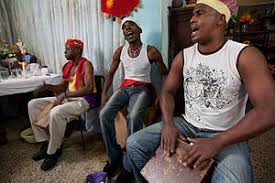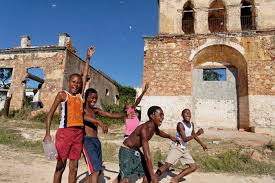 HERITAGE OF AFRICAN CULTURE IN THE LANGUAGE OF CUBA.
HERITAGE OF AFRICAN CULTURE IN THE LANGUAGE OF CUBA.
Starting in the 16th century, the forced immigration to Cuba of a large number of slaves from various parts of the African continent took place. These slaves, who spoke different languages, therefore used Spanish as a common language to communicate with each other and with their masters. However, they also tried to preserve their native language – the one that acquires a sacred character – as a way of preserving their origins.
Due to the practice of religious beliefs by Africans, many voices of sub-Saharan origin are inserted into Cuban speech. Santeria, which is the religion that practices the worship of the deities of the Yoruba people, is the one that exerted the most influence.
In addition, the Abakuá language is another that was deeply rooted not only among the followers of this sect but also among the popular layers of society.
Hence the influence of African culture on our language, specifically the Bantu culture whose religion is generically known in Cuba as the Rule of Palo Monte.
Among the most common words in our popular language and of African origin we have for example the word: Bilongo, which really means: magic remedy or according to the studies of Don Fernando Ortiz, medicinal herb. However, the truth is that bilongo for Cubans means something very different from a remedy or medicine that has nothing to do with spells or witchcraft.
Another example is in the word “Guara” which means “friend” in the Bantu culture and of course, for our colloquial language, we have it as a kind of friendship or friendly in the case of “guaroso”.
And what about a somewhat redundant phrase that we usually say when we refer to “Old Cañengo” because Cañengo precisely means old man.
On the other hand, there are many terms related to music where the African influence is denoted as in the words: “conga” which means song, guaguancó an African rhythm which means “to stiffen” like “timba” when we refer to a group of Afro-Cuban rhythms.
From Africans, we also have words like “ñáñara” which means “wound on the skin or blister” as well as “stink” which becomes a bad smell. The term “cumbancha” means in a good Cuban party or merriment and finally I would like to ask you which Cuban has never given a good “tángana” or does not currently live in the house of the quimbambas, these words are also a legacy of African culture.
 HERENCIA DE LA CULTURA AFRICANA EN EL LENGUAJE DE CUBA.
HERENCIA DE LA CULTURA AFRICANA EN EL LENGUAJE DE CUBA.
A partir del siglo XVI se produce la inmigración forzosa hacia Cuba de una gran cantidad de esclavos procedentes de diversos lugares del continente africano. Estos esclavos, que hablaban diferentes lenguas, por lo que utilizan el español como lengua común para comunicarse entre sí y con sus amos. No obstante, también trataron de conservar su lengua nativa – la que adquiere un carácter sagrado- como forma de preservar sus orígenes.
Debido a la práctica de creencias religiosas por parte de los africanos, se insertan en el habla cubana muchas voces de procedencia subsahariana. La santería que es la religión que practica el culto a las deidades del pueblo yoruba es la que más influencia ejerció.
Además, la lengua abakuá es otra que tuvo mucho arraigo no solo entre los adeptos de esta secta, sino también entre las capas populares de la sociedad.
De ahí la influencia de la cultura africana en nuestro lenguaje, específicamente la cultura Bantú cuya religión es denominada genéricamente en Cuba como Regla de Palo Monte.
Entre las palabras más comunes en nuestro lenguaje popular y de origen africano tenemos por ejemplo la palabra: Bilongo, la que realmente significa: remedio mágico o según los estudios de Don Fernando Ortiz, yerba medicinal. Sin embargo lo cierto es que bilongo para los cubanos significa algo muy diferente a un remedio o medicina que nada tiene que ver con hechizos o brujerías.
Otro ejemplo está en la palabra “Guara” la que significa “amigo” en la cultura Bantú y por supuesto para nuestro lenguaje coloquial lo tenemos como una especie de amistad o amistoso en caso de “guaroso”.
Y qué decir de una frase algo redundante que solemos decir cuando nos referimos a “Viejo Cañengo” pues precisamente Cañengo significa anciano.
Por otra parte son muchos los términos relacionados con la música donde se denota la influencia africana como en las palabras: “conga” que significa canto, guaguancó un ritmo africano que significa “ponerse rígido” al igual que “timba” cuando nos referimos a un grupo de ritmos afrocubanos.
De los africanos también tenemos palabras como “ñáñara” que significa “herida en la piel o ampolla” así como “tufo” que deviene de mal olor. El término “cumbancha” que quiere decir en buen cubano fiesta o jolgorio y por último quisiera preguntarles qué cubano no ha dado nunca una buena “tángana” o actualmente no vive en casa de las quimbambas, estas palabras también son un legado de la cultura africana.
Agencies/ HablandoCubano/ Internet Photos/ Arnoldo Varona/ www.TheCubanHistory.com
THE CUBAN HISTORY, HOLLYWOOD.



 HERITAGE of African Culture in the Language of Cuba. PHOTOS. * HERENCIA de la Cultura Africana en el Lenguage de los Cubanos. PHOTOS.
HERITAGE of African Culture in the Language of Cuba. PHOTOS. * HERENCIA de la Cultura Africana en el Lenguage de los Cubanos. PHOTOS.





